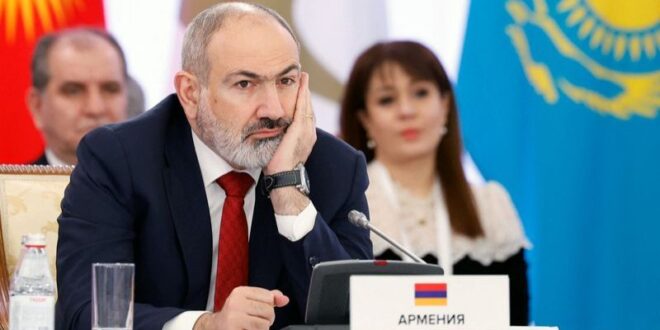(Reuters) – Armenian Prime Minister Nikol Pashinyan said in an interview published on Sunday that his country was not Russia’ ally in its war against Ukraine, but stressed its military cooperation projects were not directed against any single country.
Pashinyan also said he hoped that Armenia’s neighbour and longstanding rival, Azerbaijan, remained committed to the conclusion of a durable peace treaty despite statements by its president about demarcating borders.
Armenia and Azerbaijan fought two major wars in the past 30 years over the disputed territory of Nagorno-Karabakh. The region has long been recognised as part of Azerbaijan and Azeri troops secured full control over it last September.
Pashinyan has said in recent months that Armenia could no longer rely on Russia to ensure its defence needs as his country had not secured the help it had needed from Moscow.
In his remarks to Britain’s Daily Telegraph, Pashinyan said he had said from the outset of Russia’s February 2022 invasion of Ukraine that it could not stand alongside Moscow as an ally.
“I said, in the Ukraine situation, we are not Russia’s ally. And that’s the reality,” Pashinyan told the daily.
“But I want to also tell you that with the U.S. or France or other partners, our security cooperation is not targeted against our other security sector partner.”
He said Armenia was approaching the notion of relationships on its security alliances “by utmost transparently speaking with our partners about their shared agendas”.
And Armenia, he said, had no intention of considering membership of NATO — as Ukraine has reaffirmed and Russia has denounced as unacceptable. Nato membership “is not a question we have discussed or are discussing”.
He repeated that Armenia was considering whether to stay in the Russian-led Collective Security Treaty Organisation.
On the prospects for a long-term peace deal with Azerbaijan, Pashinyan said “the basic architecture” of an agreement had been reached last year “and at the end of last year, it seemed to us that we were very close, finally, to a final text of agreement”.
But Azerbaijani President Ilham Aliyev, re-elected in a landslide last week, raised questions in a January interview by saying his troops would not pull back from border areas. He also dismissed the use of Soviet-era maps in talks as he said territorial concessions had been made to Armenia last century.
(Reporting by Ron Popeski; editing by Diane Craft)
 BeritaKini.biz Berita Viral Terkini di Malaysia
BeritaKini.biz Berita Viral Terkini di Malaysia





